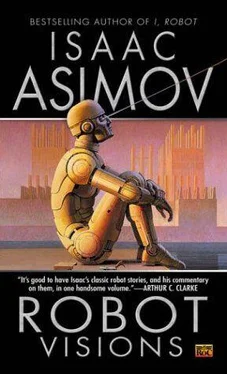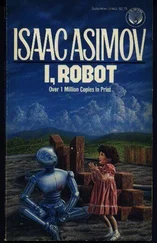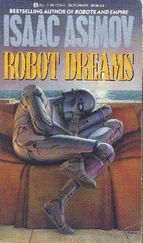Isaac Asimov - Robot Visions
Здесь есть возможность читать онлайн «Isaac Asimov - Robot Visions» весь текст электронной книги совершенно бесплатно (целиком полную версию без сокращений). В некоторых случаях можно слушать аудио, скачать через торрент в формате fb2 и присутствует краткое содержание. Жанр: Фантастика и фэнтези, на английском языке. Описание произведения, (предисловие) а так же отзывы посетителей доступны на портале библиотеки ЛибКат.
- Название:Robot Visions
- Автор:
- Жанр:
- Год:неизвестен
- ISBN:нет данных
- Рейтинг книги:5 / 5. Голосов: 1
-
Избранное:Добавить в избранное
- Отзывы:
-
Ваша оценка:
- 100
- 1
- 2
- 3
- 4
- 5
Robot Visions: краткое содержание, описание и аннотация
Предлагаем к чтению аннотацию, описание, краткое содержание или предисловие (зависит от того, что написал сам автор книги «Robot Visions»). Если вы не нашли необходимую информацию о книге — напишите в комментариях, мы постараемся отыскать её.
Robot Visions — читать онлайн бесплатно полную книгу (весь текст) целиком
Ниже представлен текст книги, разбитый по страницам. Система сохранения места последней прочитанной страницы, позволяет с удобством читать онлайн бесплатно книгу «Robot Visions», без необходимости каждый раз заново искать на чём Вы остановились. Поставьте закладку, и сможете в любой момент перейти на страницу, на которой закончили чтение.
Интервал:
Закладка:
It was odd how that last deed caught the imagination of the world. All that Andrew had done before had not swayed them. But he had finally accepted even death to be human, and the sacrifice was too great to be rejected.
The final ceremony was timed, quite deliberately, for the two hundredth anniversary. The World President was to sign the act and make the people’s will law. The ceremony would be visible on a global network and would be beamed to the Lunar state and even to the Martian colony.
Andrew was in a wheelchair. He could still walk, but only shakily.
With mankind watching, the World President said, “Fifty years ago, you were declared The Sesquicentennial Robot, Andrew.” After a pause, and in a more solemn tone, he continued, “Today we declare you The Bicentennial Man, Mr. Martin.”
And Andrew, smiling, held out his hand to shake that of the President.
Andrew’s thoughts were slowly fading as he lay in bed. Desperately he seized at them. Man! He was a man!
He wanted that to be his last thought. He wanted to dissolve- die with that.
He opened his eyes one more time and for one last time recognized Li-hsing, waiting solemnly. Others were there, but they were only shadows, unrecognizable shadows. Only Li-hsing stood out against the deepening gray.
Slowly, inchingly, he held out his hand to her and very dimly and faintly felt her take it.
She was fading in his eyes as the last of his thoughts trickled away. But before she faded completely, one final fugitive thought came to him and rested for a moment on his mind before everything stopped.
“Little Miss,” he whispered, too low to be heard.
Someday
Niccolo Mazetti lay stomach down on the rug, chin buried in the palm of one small hand, and listened to the Bard disconsolately. There was even the suspicion of tears in his dark eyes, a luxury an eleven-year-old could allow himself only when alone.
The Bard said, “Once upon a time in the middle of a deep wood, there lived a poor woodcutter and his two motherless daughters, who were each as beautiful as the day is long. The older daughter had long hair as black as a feather from a raven’s wing, but the younger daughter had hair as bright and golden as the sunlight of an autumn afternoon.
“Many times while the girls were waiting for their father to come home from his day’s work in the wood, the older girl would sit before a mirror and sing-”
What she sang, Niccolo did not hear, for a call sounded from outside the room: “Hey, Nickie.”
And Niccolo, his face clearing on the moment, rushed to the window and shouted, “Hey, Paul.”
Paul Loeb waved an excited hand. He was thinner than Niccolo and not as tall, for all he was six months older. His face was full of repressed tension which showed itself most clearly in the rapid blinking of his eyelids. “Hey, Nickie, let me in. I’ve got an idea and a half. Wait till you hear it.” He looked rapidly about him as though to check on the possibility of eavesdroppers, but the front yard was quite patently empty. He repeated, in a whisper, “Wait till you hear it.”
“All right. I’ll open the door.”
The Bard continued smoothly, oblivious to the sudden loss of attention on the part of Niccolo. As Paul entered, the Bard was saying. “… Thereupon, the lion said, ‘If you will find me the lost egg of the bird which flies over the Ebony Mountain once every ten years, I will-’ “
Paul said, “Is that a Bard you’re listening to? I didn’t know you had one.”
Niccolo reddened and the look of unhappiness returned to his face. “Just an old thing I had when I was a kid. It ain’t much good.” He kicked at the Bard with his foot and caught the somewhat scarred and discolored plastic covering a glancing blow.
The Bard hiccupped as its speaking attachment was jarred out of contact a moment, then it went on: “-for a year and a day until the iron shoes were worn out. The princess stopped at the side of the road…”
Paul said, “Boy, that is an old model,” and looked at it critically.
Despite Niccolo’s own bitterness against the Bard, he winced at the other’s condescending tone. For the moment, he was sorry he had allowed Paul in, at least before he had restored the Bard to its usual resting place in the basement. It was only in the desperation of a dull day and a fruitless discussion with his father that he had resurrected it. And it turned out to be just as stupid as he had expected.
Nickie was a little afraid of Paul anyway, since Paul had special courses at school and everyone said he was going to grow up to be a Computing Engineer.
Not that Niccolo himself was doing badly at school. He got adequate marks in logic, binary manipulations, computing and elementary circuits; all the usual grammar-school subjects. But that was it! They were just the usual subjects and he would grow up to be a control-board guard like everyone else.
Paul, however, knew mysterious things about what he called electronics and theoretical mathematics and programing. Especially programing. Niccolo didn’t even try to understand when Paul bubbled over about it.
Paul listened to the Bard for a few minutes and said, “You been using it much?”
“No!” said Niccolo, offended. “I’ve had it in the basement since before you moved into the neighborhood. I just got it out today-” He lacked an excuse that seemed adequate to himself, so he concluded, “I just got it out.”
Paul said, “Is that what it tells you about: woodcutters and princesses and talking animals?”
Niccolo said, “It’s terrible. My dad says we can’t afford a new one. I said to him this morning-” The memory of the morning’s fruitless pleadings brought Niccolo dangerously near tears, which he repressed in a panic. Somehow, he felt that Paul’s thin cheeks never felt the stain of tears and that Paul would have only contempt for anyone else less strong than himself.
Niccolo went on, “So I thought I’d try this old thing again, but it’s no good.”
Paul turned off the Bard, pressed the contact that led to a nearly instantaneous reorientation and recombination of the vocabulary, characters, plot lines and climaxes stored within it. Then he reactivated it.
The Bard began smoothly, “Once upon a time there was a little boy named Willikins whose mother had died and who lived with a stepfather and a stepbrother. Although the stepfather was very well-to-do, he begrudged poor Willikins the very bed he slept in so that Willikins was forced to get such rest as he could on a pile of straw in the stable next to the horses-”
“Horses!” cried Paul.
“They’re a kind of animal,” said Niccolo. “I think.”
“I know that! I just mean imagine stories about horses.”
“It tells about horses all the time,” said Niccolo. “There are things called cows, too. You milk them but the Bard doesn’t say how.”
“Well, gee, why don’t you fix it up?”
“I’d like to know how.”
The Bard was saying, “Often Willikins would think that if only he were rich and powerful, he would show his stepfather and stepbrother what it meant to be cruel to a little boy, so one day he decided to go out into the world and seek his fortune.”
Paul, who wasn’t listening to the Bard, said, “It’s easy. The Bard has memory cylinders all fixed up for plot lines and climaxes and things. We don’t have to worry about that. It’s just vocabulary we’ve got to fix so it’ll know about computers and automation and electronics and real things about today. Then it can tell interesting stories, you know, instead of about princesses and things.”
Niccolo said despondently, “I wish we could do that.”
Читать дальшеИнтервал:
Закладка:
Похожие книги на «Robot Visions»
Представляем Вашему вниманию похожие книги на «Robot Visions» списком для выбора. Мы отобрали схожую по названию и смыслу литературу в надежде предоставить читателям больше вариантов отыскать новые, интересные, ещё непрочитанные произведения.
Обсуждение, отзывы о книге «Robot Visions» и просто собственные мнения читателей. Оставьте ваши комментарии, напишите, что Вы думаете о произведении, его смысле или главных героях. Укажите что конкретно понравилось, а что нет, и почему Вы так считаете.








